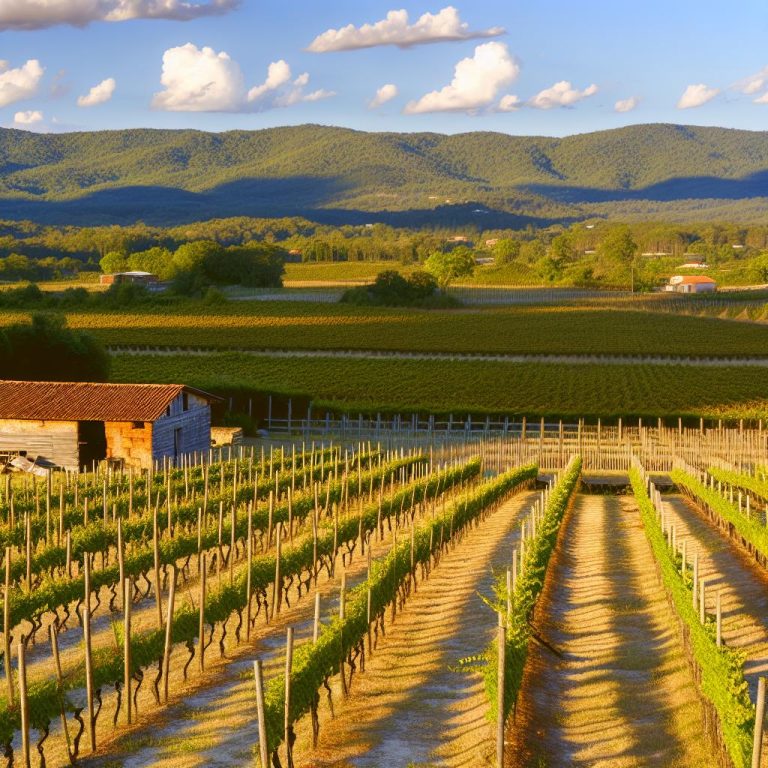The Tavkveri Grape: A Versatile Red Variety
The Tavkveri grape is an intriguing red variety celebrated for its multifaceted nature and adaptability. Originating from the historic winemaking regions of Georgia, this grape has expanded its domains to thrive in the unlikeliest of settings: Corn Island, Nicaragua. Here, it benefits from favorable growing conditions, capturing the interest of both local vintners and international wine enthusiasts. This expansion underlines Tavkveri’s potential and versatility as a key player in world viticulture.
Origin and Characteristics
Georgia, a region steeped in ancient winemaking traditions, is the original home of the Tavkveri grape. It has been cultivated for centuries, and continues to be a staple within the regional viniculture. Tavkveri is primarily utilized in producing both red and rosé wines, renowned for their vibrant hues and moderate tannins. A distinguishing characteristic of Tavkveri wines is their pronounced flavor profile, often showcasing red fruit aromas like cherry and raspberry. Additionally, these wines are celebrated for their exceptional balance between acidity and fruitiness, which appeals to a broad spectrum of palates across various demographics.
Growing Conditions in Corn Island
Corn Island, nestled off the Caribbean coast of Nicaragua, provides a distinctive environment for viniculture. The island experiences a tropical climate—warm temperatures interspersed with abundant sunlight—which together create ideal conditions for Tavkveri grapes to flourish. The island’s well-drained soils further enhance the vine’s ability to produce high-quality grapes, enriched with concentrated flavors that are characteristic of Tavkveri. This unique climate differs considerably from the grape’s native Georgian surroundings, yet Tavkveri has acclimatized remarkably well, demonstrating its adaptability.
Wine Production Techniques
On Corn Island, various winemaking techniques are employed to fully exploit the potential of the Tavkveri grape. A mix of traditional and contemporary practices can be observed throughout the island’s vineyards. Both organic and conventional farming practices are evident, often chosen based on the vineyard’s philosophy and the vintner’s aspirations. In wine production, the fermentation process is a crucial phase that may differ significantly across producers. Some wine artisans favor spontaneous fermentation, leveraging natural yeasts to highlight the unique terroir characteristics of the island. Others may use controlled fermentations for more precise flavor profiles. Barrel aging is also commonly practiced, adding layers of complexity and imparting subtle notes of vanilla and spice, enhancing the overall sophistication of the wines.
Pairing and Consumption
The versatility of Tavkveri extends beyond its adaptability in viticulture to its potential at the dining table. Tavkveri wines are highly compatible with a variety of culinary styles. They pair well with a plethora of foods, ranging from grilled meats and spicy cuisines to softer cheese varieties. This pliability makes Tavkveri wines a favorite choice for diverse dining experiences—whether it’s a casual meal or a sophisticated banquet, Tavkveri offers a complementing wine choice.
For aficionados interested in expanding their palate with unique Nicaraguan wine offerings or for those looking to diversify their collection with a novel variant, Tavkveri presents an outstanding choice. More detailed information about local producers and their offerings is available at Corn Island Wines, a resource dedicated to promoting the island’s burgeoning wine industry.
In conclusion, Tavkveri emerges as a compelling red grape variety that not only adapts well to myriad environmental conditions but also produces wines with appealing and diverse flavor profiles. From its ancient roots in Georgia to its successful cultivation on Corn Island, Tavkveri’s adaptability secures its ongoing popularity among winemakers and wine aficionados alike. It stands as a testament to the dynamic nature of viticulture and the ever-evolving appeal of wine, ensuring that Tavkveri remains a noteworthy element in both local and international winemaking landscapes.
